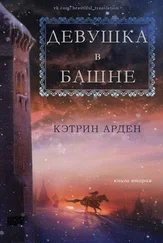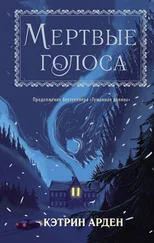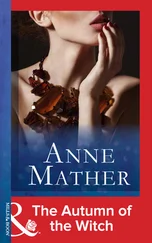It was too much to take in. But she took the jewel. It was warm in her hand; she caught a faint whiff of salt. It felt as though he’d handed her a key to herself, but one she could not examine. There was too much else to do.
“Then I will go to the sea,” she said. “If I survive the dawn.”
He said heavily, “I will be at the battle. But my task is still the dead, Vasya.”
“Mine is the living,” said the Bear, and he smiled. “What a pair we are, my twin.”
GRIM DAY, AND ALL ABOUT them the army was stirring; beyond, far out on the great field of Kulikovo, the Tatars were awake. The Russians could hear the Tatars’ horses snorting into the chill. But nothing could be seen; the world was obscured in thick mist.
“No battle until the fog burns off,” said Sasha. He had no stomach for food, but he drank a little mead, passed the bottle to Vasya. When he woke, he’d found her already awake, sitting alone before his renewed fire, a line between her brows, pale but composed.
It was cold, the sky gray above the mist, promising more early snow. Then the sun heaved a cold rim over the edge of the earth, and the mist began to thin. He drew a deep breath. “I must go to Dmitrii. He is waiting for a messenger. Whatever happens, I will find you before the fighting begins. In the meantime, go with God, sister. You are to go unseen and run no risks.”
“No,” she said and smiled reassuringly. “My business is with chyerti this day. Not with the swords of men.”
“I love you, Vasochka,” he said, and left her.
* * *
THE MESSENGER HAD RETURNED, and the Tatars had accepted Dmitrii’s challenge. They had also brought the name of Mamai’s champion. Sasha and Dmitrii heard it with the same cold thrill of rage.
“I have dozens of men who would take your place,” said Dmitrii. “But—”
“Not with this champion,” said Sasha. “If he is not to be yours, then he is mine, brother.”
Dmitrii did not disagree. They stood together in his tent, while attendants ran in and out. All about them was the neighing and the ringing of steel and the shouts of the waking army. The Grand Prince offered his cousin bread, and Sasha forced a little of it down.
“Besides,” Sasha added, keeping the anger from his voice. “Another man would take the glory for his own city: for Tver or Vladimir or Suzdal. It must be for Rus’ and for God, brother, for on this field we are one people.”
“One people,” said Dmitrii thoughtfully. “Did your sister return? With her—followers?”
“Yes,” said Sasha, and gave his cousin a dark look. “She is tempered like steel now and so very young, and I blame you for pulling her into this.”
Dmitrii did not look repentant. “She knows the stakes as well as I.”
Sasha said, “She says let men beware of the river. And also to trust that the trees will conceal them, and to fear neither storm nor fire.”
“I can’t decide if that is welcome or ominous,” said Dmitrii.
“Perhaps both,” said Sasha. “Nothing about my sister is simple. Brother, if I—”
Dmitrii shook his head sharply. “Do not say it. But yes—she will be as a sister to me too; she need fear nothing from my hand.”
Sasha bowed his head and said not a word.
“Come then,” said Dmitrii. “I will arm you.”
Mail shirt and cuirass, a shield, a leaf-shaped spear, red at the haft. Good boots, cuisses for his thighs. A pointed helm. It was soon done. Sasha’s fingertips felt cold. “Where is your armor?” he asked Dmitrii. The Grand Prince was dressed as a minor boyar, one of hundreds.
Dmitrii looked cheerful, like a boy caught in mischief. His attendants, the ones Sasha could see, looked simultaneously anxious and exasperated. “I had one of my boyars change places with me,” he said. “Do you think I want to sit on a hill clad in scarlet? No. I will fight properly, and I will not give the Tatar bowmen a better target than I can help.”
“Your cause is defeated if you are slain,” said Sasha.
“My cause is defeated if I am not the leader of this host,” said Dmitrii. “For Rus’ will fracture, if I am not lord. They will be as leaves in defeat, scattering in a strong wind, or they will be overproud in victory, each trying to claim a greater share than the others. No, I will play for the great prize. What else is there?”
“What indeed?” said Sasha. “I have served you as well as God, cousin,” he said. “And been proud to do it. For all I’ve done—or not done—forgive me.”
“Do we talk of forgiveness, brother?” said Dmitrii. “The left hand does not beg forgiveness of the right.” He clapped Sasha on the back. “Go with God.”
Armed, they went out to where the army waited, drawn up on the field of Kulikovo. It was a little before noon by then, and the mist was burning away.
“I must find my sister,” said Sasha. “I did not bid her a proper farewell.”
“There is not time,” said Dmitrii. A man brought his horse, and he swung to the saddle. As the sun broke through the last of the fog, he raised a hand to shade his eyes. “Look, there is their champion now.”
Dmitrii was right. The Tatar champion had appeared and a roar echoed from a hundred thousand throats. Sasha, his heart beating fast, mounted Tuman. The steady mare only pricked her ears at the noise. “Tell her farewell, since I cannot,” he said.
As Sasha rode out onto the great sloshing field before the two hosts, he thought he saw a flash of gold: Pozhar galloping unseen among the host of Rus’. Sasha raised his hand to the glimmer. It was all he could do.
Go with God, little sister.
* * *
VASYA MOUNTED POZHAR as soon as her brother left to go to the Grand Prince. The Bear was snuffing the air, pleased, Vasya thought, at the tension. He turned a teeth-baring grin to her. “What now, mistress?”
Morozko had left her just as dawn touched the sky. There was still something of his presence in the cold mist, the few snowflakes just drifting down in the wind that riffled the pennants of the Russian host. She felt caught again between them: the Bear’s joy in battle and Morozko’s grief at destruction. The Bear’s presence and the winter-king’s absence.
Very well; Morozko’s work was with the dead.
Hers was with the living.
But not, just now, with men.
The first one she saw was like a great black bird with the face of a woman. She soared across the battlefield, rippling banners with her wings, and though men could not see her they looked up, as though they felt her shadow upon themselves and upon the day.
The next was the leshy, stepping softly to the border of his forest; the scrubby forest that ringed the battlefield, the forest that currently concealed Vladimir Andreevich and his cavalry, waiting for the right moment to charge.
Vasya nudged Pozhar and the golden mare, streaming sparks, galloped between the ranks of men, the tents, so that Vasya could go have a word with the forest-lord.
“I will keep the men hidden,” said the leshy, when Vasya had clasped his twiggy fingers with her bloody ones, “and bewilder their enemies. For your promises and the Grand Prince’s, Vasilisa Petrovna.”
So it was all across the battlefield. While Sasha armed, and men ate and drew up rank on rank, the chyerti gathered in the thick mist. The vodianoy gurgled in his river; his daughters the rusalki waited on the banks. Some Vasya knew by sight. Many she didn’t. But still they came until the battlefield was teeming, haunted, and she felt the weight of their eyes, and their trust.
The thick mist had begun to burn away. She was already sweating, despite the chill, with nerves and with exertion, riding Pozhar here and there to rally and dispose and encourage her own people in and around Dmitrii’s.
Читать дальше
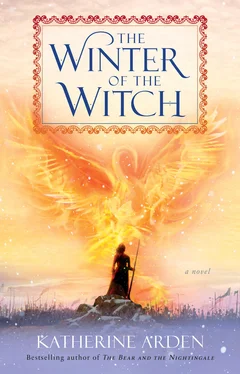

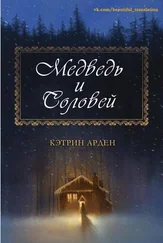

![Кэтрин Арден - Мертвые голоса [litres]](/books/389907/ketrin-arden-mertvye-golosa-litres-thumb.webp)


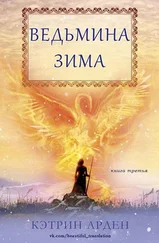
![Кэтрин Арден - Девушка в башне [litres]](/books/415518/ketrin-arden-devushka-v-bashne-litres-thumb.webp)
